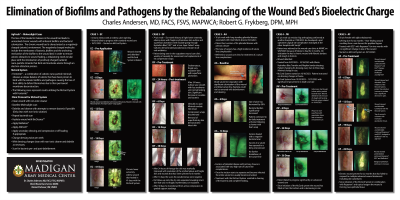Case Series/Study
(CS-008 (RPT-001)) Elimination of Biofilms and Pathogens by the Rebalancing of the Wound Bed’s Bioelectric Charge: In Vivo and In Vitro Experience

Methods:
The loss of the bioelectric balance in the wound bed leads to unresolved chronic wounds with inherent biofilms and bacterial colonization. The chronic wound bed is characterized as a negatively charged (anionic) environment. The negatively charged molecules include the membranes of bacteria, biofilm, and the anchoring mechanism of the biofilm to the wound bed. To remove anionic obstacles to wound healing, a rebalancing must occur with the introduction of positively charged (cationic) nano-particle minerals that bind and inactivate anions through an electron attraction process. Bentonite, a combination of cationic nano-particle minerals, releases a unique balance of cations that have been proven to bind with the anionic biofilms and pathogens causing the loss of their ability to defend themselves due to their permanent membrane deconstruction.
A biofilm model was established, and the results of bentonite exposure were recorded.
Results:
Bentonite test product resulted in a 99.9% log reduction in Staphylococcus epidermidis, Escherichia coli, Candida albicans, Methicillin Resistant Staphylococcus aureus, Streptococcus pyogenes, Pseudomonas aeruginosa, Klebsiella pneumoniae, and Clostridioides difficile.
Early clinical experience with bentonite based wound care system has demonstrated a decrease in bacteria, decrease in exudate and more rapid healing of chronic wounds. Five illustrative cases will be presented.
Discussion: Bentonite is effective against biofilms and pathogens in vivo and in vitro.

.jpeg)
